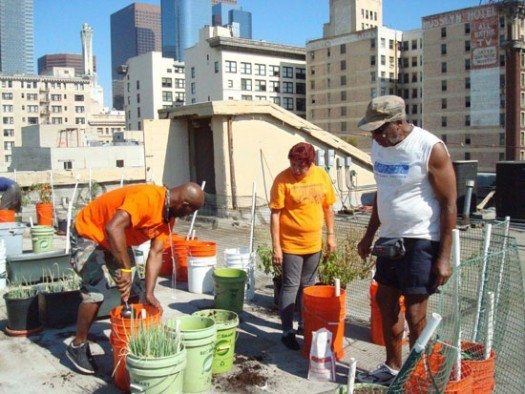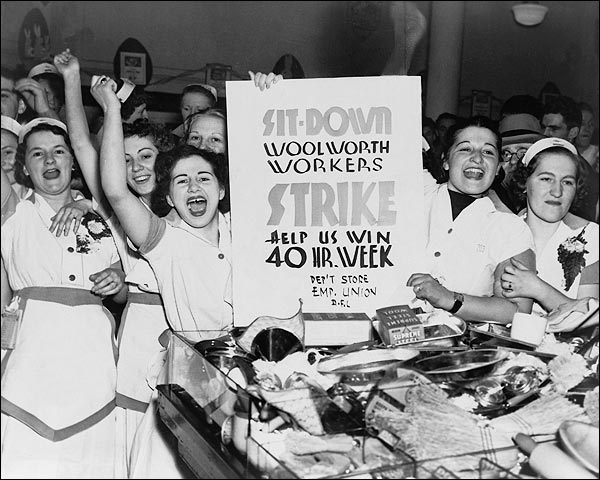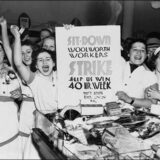

L.A. Superior Court judges are doing the wrong thing. They decided to deal with a $53 million budget deficit by arbitrarily closing eight courthouses around L.A. County, which will send justice into chaos, inconvenience people and cause transportation and other problems.
The courthouses scheduled to close as of June 28 or sooner are: Huntington Park, Whittier, Pomona North, Malibu, West Los Angeles, San Pedro, Beacon Street and the Kenyon Juvenile Justice Center, located in South L.A.
The Judges Didn’t Ask Us
Did the judges who came up with this plan consult the communities that will be impacted? No. Did they talk to the citizens, the small business people, or anyone else this might affect? No.
As a result, some case types will be heard in only certain courthouses. For example, if you are threatened with eviction or your landlord wants to kick you out of your place and you want to fight it,
» Read more about: Don’t Close the Courts of First Resort! »


What do big banks and L.A. port trucking companies have in common? Fine print in contracts that traps victims into signing bad deals.
We’ve all signed our share of contracts. Rental agreements, cell phone contracts, car loans. You don’t need to be a legal scholar to understand the basic concept: Two parties enter into an agreement that lasts until a fixed date. And as frustrated as you may get with, say, your landlord, you know that at the very least what you’ve signed off on can’t change upon a whim. Even if you don’t like the terms, contracts are fundamentally about guaranteeing stability.
We take this for granted – but not everyone can. A case in point is drivers at Green Fleet Systems, a trucking company serving the Ports of Los Angeles and Long Beach.
In order to work as an “independent contractor” for the company,


The West, Texas chemical and fertilizer plant where at least 15 were killed and more than 200 injured a few weeks ago hadn’t been fully inspected by the Occupational Safety and Health Administration since 1985. (A partial inspection in 2011 had resulted in $5,250 in fines.)
OSHA and its state partners have a total of 2,200 inspectors charged with ensuring the safety of more than eight million workplaces employing 130 million workers. That comes to about one inspector for every 59,000 American workers.
There’s no way it can do its job with so few resources, but OSHA has been systematically hollowed out for years under Republican administrations and congresses that have despised the agency since its inception.
In effect, much of our nation’s worker safety laws and rules have been quietly repealed because there aren’t enough inspectors to enforce them.
That’s been the Republican strategy in general: When they can’t directly repeal laws they don’t like,


 National Small Business Week is coming up in June, offering a good opportunity to contemplate what role small businesses play in both our cities and economy.
National Small Business Week is coming up in June, offering a good opportunity to contemplate what role small businesses play in both our cities and economy.
While most small businesses have a small workforce, cumulatively they provide a large percentage of the nation’s jobs. Many of the workers they hire are harder to employ, particularly in disadvantaged and immigrant communities. According to the U.S. Small Business Administration, “More than half of Americans either own or work for a small business, [which] create about two out of every three new jobs in the U.S. each year.” They also contribute to our local economies more than national or multinational corporations by keeping revenues in their local areas.
Companies like Walmart, Amazon and Target have come to dominate our commercial landscape, on the ground and virtually. These one-stop retailers can destroy their competition – mainly a wide variety of small businesses but also high-road large retailers – by taking a heavy-handed,


As you’ve probably heard, the Senate is now selling a new brand of immigration reform bill called the Border Security, Economic Opportunity, and Immigration Modernization Act of 2013. Senators — both Democrat and Republican — have stirred together a complex and massive proposal that has potential to become law, driven by a strong showing of immigrant voters in the November election.
This proposal is a huge deal for everyone who eats, and therefore matters for those working for healthy, fair and sustainable food systems and food sovereignty. Food sovereignty is the right of people to determine their own food and agriculture policies — it’s the democratization of food and agriculture. This democratization includes food chain workers having a voice in their workplace, in their communities and in government.
Unjust free trade agreements and international trade policies have forced family farmers off their land and decimated domestic industries in other countries. Many people then face few choices other than migrating from their home countries in search of work,


 Today, millions of Americans who contribute to the wealth and prosperity of our country don’t get the credit they deserve. One of the closest things to economic democracy we have in this country, Employee Stock Ownership Plans (ESOPs), is something that President Barack Obama cut from his 2014 budget.
Today, millions of Americans who contribute to the wealth and prosperity of our country don’t get the credit they deserve. One of the closest things to economic democracy we have in this country, Employee Stock Ownership Plans (ESOPs), is something that President Barack Obama cut from his 2014 budget.
An ESOP is a type of employee retirement or savings plan, similar to stock bonuses, but with the ability to borrow money. ESOPs are typically created to buy out an owner’s interest in a company, or reward workers with the bonus of stock ownership. The stock is held in a trust fund, and employees can cash in their shares when they leave or retire.
ESOPs encourage and expand retirement savings by offering workers equity in the companies where they work. They can be a handy fix when a business needs a bailout. And studies show that they tend to increase productivity,
» Read more about: Where Credit Is Due: Employee Stock Ownership Plans »


When Wahid Rashad, 65, sees young people in Chicago chugging bottles of sugary drinks and chomping on fluorescent-orange snacks, he thinks: “That’s garbage. It doesn’t enhance the brain and energy level.”
Rashad sells apples, mangoes, papayas and peppers from a produce cart in the city’s Uptown neighborhood. Among the comments he hears from customers since he started selling in the neighborhood, especially from the younger ones: “Hey, Juicy Fruit, where were you? I was looking for you.”
“I look at myself as an educator,” said Rashad, a vendor in the Neighbor Carts program. “It’s like water: Drip, drip, drip. It builds a relationship.”
Throughout the country, grassroots community programs, such as Neighbor Carts, are fueling a block-by-block movement to provide fresh fruit and vegetables in “food deserts,” urban neighborhoods and rural areas where people don’t have ready access to fresh produce.
From Chicago to Georgia to Los Angeles,


One of California’s best-kept secrets is that May is Labor History Month. Signed into law as AB 2269 (Swanson) in 2012 by Governor Jerry Brown, its purpose is to encourage schools to commemorate this month with appropriate educational exercises that make pupils aware of the role the labor movement has played in shaping California and the United States.
That role is the making and defense of the middle class. Unions have been, and remain, by far the most important engine in creating the American Dream, homeownership for the millions, and a better life for each generation. Most of the middle class arrived in that economic neighborhood when working people got together, formed unions, and wrested a fair share of what they produced from their employers. In other words, it was by acting like a working class that most of our families became middle class.
The economic advancement of workers relies on the escalator of collective struggle.


On January 16, 2013, just after 5 a.m., 12 sheriff’s deputies and 10 Portland police officers forcefully evicted the original Portland foreclosure fighters – Debbie and Ron Austin – from their NE Portland home. The eviction was at the demand of the government sponsored and funded mortgage finance vehicle, Fannie Mae.
The family was evicted, but their home is not empty. A force of armed private security guards from McRoberts Security was immediately installed in Debbie Austin’s home. The guards have been on 24-hour duty in the home ever since.
Typical cost for private security indicates that Fannie Mae is spending $480-$600 a day, or $15,000 a month on 24-hour armed guards. Since the Austins’ January eviction, Fannie Mae has spent nearly $50,000 of essentially public money to keep one home empty.
“It was horrifying. I was standing on the sidewalk at 6 a.m. in my pajamas watching the sheriff change the locks and seeing armed security forces enter my home,”


 Bestselling novelist Lisa See’s Los Angeles roots go back five generations – the Chinese branch of her biracial family has been involved in 100 years of Chinatown’s history. See, the author of Dreams of Joy and Shanghai Girls, will be the keynote speaker at the Los Angeles Alliance for a New Economy’s annual Women for a New Los Angeles Luncheon on May 10. She spoke to Frying Pan News about women writers, Walmart and changes in L.A.
Bestselling novelist Lisa See’s Los Angeles roots go back five generations – the Chinese branch of her biracial family has been involved in 100 years of Chinatown’s history. See, the author of Dreams of Joy and Shanghai Girls, will be the keynote speaker at the Los Angeles Alliance for a New Economy’s annual Women for a New Los Angeles Luncheon on May 10. She spoke to Frying Pan News about women writers, Walmart and changes in L.A.
Frying Pan News: Your family’s been here longer than most.
Lisa See: We are part of a continuum of women and men who came here and continue to come here. And it’s not only men who come to a place, as pioneers or for a new job. A great-great aunt came here in 1915 from Colorado, opened a millinery shop and caught TB. My great-great grandmother and her husband came West to Waterville,